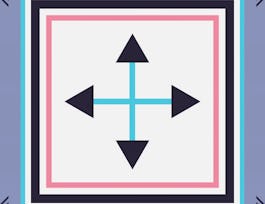Graphic Design is all around us! Words and pictures—the building blocks of graphic design—are the elements that carry the majority of the content in both the digital world and the printed world. As graphic design becomes more visible and prevalent in our lives, graphic design as a practice becomes more important in our culture.



Fundamentals of Graphic Design
This course is part of Graphic Design Specialization

Instructor: Michael Worthington
Sponsored by ITC-Infotech
814,361 already enrolled
(17,817 reviews)
What you'll learn
Implement the fundamentals of color: visual, rhythm, and pattern in design
Use scale, weight, direction, texture, and space in a composition
Typeset text and experiment with letter forms
Create your own series of images using different image making techniques
Skills you'll gain
Details to know

Add to your LinkedIn profile
2 assignments
See how employees at top companies are mastering in-demand skills

Build your subject-matter expertise
- Learn new concepts from industry experts
- Gain a foundational understanding of a subject or tool
- Develop job-relevant skills with hands-on projects
- Earn a shareable career certificate


Earn a career certificate
Add this credential to your LinkedIn profile, resume, or CV
Share it on social media and in your performance review

There are 6 modules in this course
Welcome! In this first module I will summarize the assignments and expectations of this course.
What's included
4 videos8 readings1 discussion prompt
This week we are going to look at how images function in terms of conveying denotative and connotative messages, I'll show you a range of analog and digital imagemaking techniques and discuss how they work. In the first peer review assignment you'll create your own series of images, experimenting with formal techniques. Later, you'll have the opportunity to rework those images to enhance their ability to communicate an idea through connotation in an optional assignment: give it a try, it'll help you develop your communication skills as well as your formal skills!
What's included
13 videos2 peer reviews
This week we are going to look at typographic terminology and the basic rules for creating typography. I'll show you a range of tips and techniques for working with type, in both a functional and expressive manner, and you'll find out about the process involved in making and controlling typography. This week you'll complete a quiz to make sure you understand the language of typography–this is required. I also highly recommend you complete the two optional peer review assignments. In the first assignment you'll create your own typographic monogram, and you'll use that as a central element in designing a typographic business card in the second assignment. Give them a try, they are the place where you can demonstrate and apply your formal skills, and the place where you get to play with type!
What's included
12 videos1 assignment2 peer reviews
This week we are going to look at how designers work with shape and color as their fundamental building blocks. You'll learn about visual contrast, color, rhythm and pattern in design. I'll be showing you the process involved in making an abstract design from shapes, and how to use that element to create a repeating pattern design. You'll be completing a quiz (required!) to make sure you understand how visual contrast and color work, and I also highly recommend you complete the two optional peer review assignments. In the first assignment you'll create your own simple and complex design motifs, and you'll use them as the central elements in designing a repeating pattern in the second assignment. The assignments are optional, but they are the place where you get to demonstrate and apply your formal skills, so well worth taking the extra time to complete!
What's included
10 videos1 assignment2 peer reviews
This week we are going to look at how designers work with visual contrasts, cropping, hierarchy and direction in single images and complex compositions. You'll find out how to control and use scale, weight, direction, texture, and space in a composition, and how to compose work that ranges from the complex to the minimal. In the first peer review assignment you'll create your own abstract compositions that demonstrate your knowledge and control of visual contrast. In the final optional assignment, you can use all your skills from the entire course to create experimental compositions in the form of a poster for a mythical band. This last project is optional, but I strongly suggest you try it out, it'll let you grow and apply your design knowledge and really enjoy and express yourself in your design work!
What's included
12 videos1 reading3 peer reviews
In this section we've provided some useful resources for students wishing to further their studies in graphic design. The information was authored by Calvin Rye, MFA alumnus of the Graphic Design program at CalArts in consultation with CalArts' Graphic Design faculty and our Office of Admissions. In addition to some advice about selecting the right program of study, we've also included some tips for creating and presenting a strong, organized portfolio and writing your artist statement. These are essential components of any application to a graphic design program, as well as a freelance graphic designer's toolkit. Regardless if you are applying to schools or looking for work in the field, we hope you find these tips and resources useful to your goals.
What's included
4 readings
Instructor

Offered by
Why people choose Coursera for their career




Learner reviews
17,817 reviews
- 5 stars
82.04%
- 4 stars
14.47%
- 3 stars
2.20%
- 2 stars
0.48%
- 1 star
0.79%
Showing 3 of 17817
Reviewed on Sep 5, 2021
I had a lot of fun in this course. I learnt some extra bits of information related to graphic design and I think it's a great start for beginners as well as good practice for intermediate and experts!
Reviewed on Oct 31, 2022
Well structured and full of practical lessons. Clear and informative lectures for each design elements. I highly recommend this course both for beginners and graphic designers with some experiences.
Reviewed on Jul 24, 2020
this course has given me the best information about the basics of Graphic design, and i am delighted for finishing this course, looking forward to building upon the basics obtained from this course!!
Recommended if you're interested in Arts and Humanities

Epic Games

California Institute of the Arts
 Status: [object Object]
Status: [object Object]Google

Epic Games

Open new doors with Coursera Plus
Unlimited access to 10,000+ world-class courses, hands-on projects, and job-ready certificate programs - all included in your subscription
Advance your career with an online degree
Earn a degree from world-class universities - 100% online
Join over 3,400 global companies that choose Coursera for Business
Upskill your employees to excel in the digital economy


